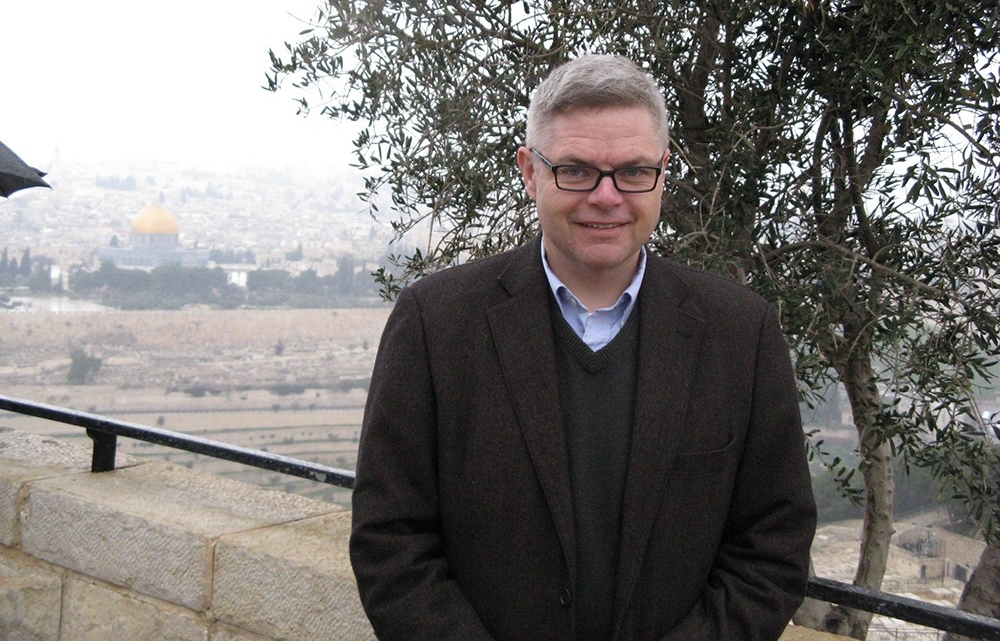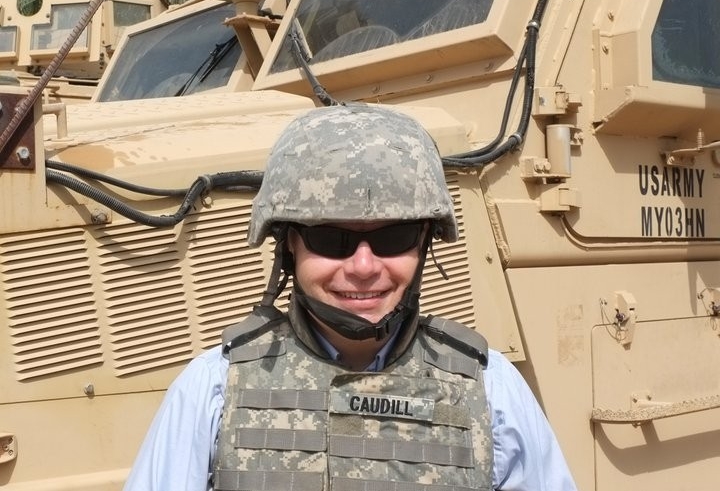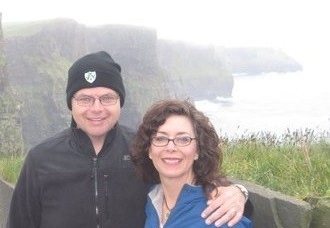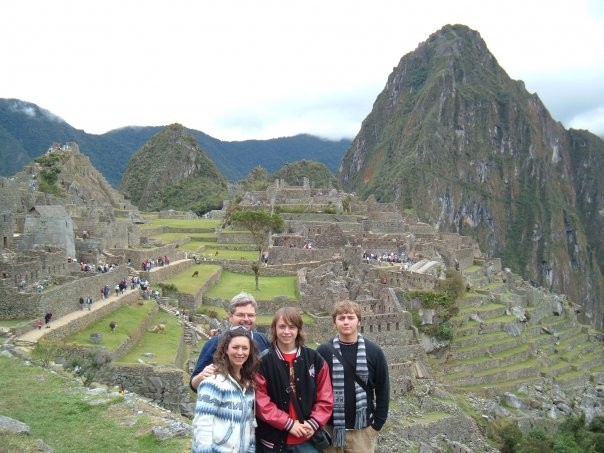University of Cincinnati alumnus David Caudill stands at an overlook in Jerusalem. photos/submitted

University of Cincinnati alumnus David Caudill stands at an overlook in Jerusalem. photos/submitted
By Ethan Rudd
513-556-5224
Sept. 14, 2017
An assortment of knickknacks rest in the corners of David Caudill’s house. A cuckoo clock from Germany hangs on one wall. An ornate tea table from Qatar stands near a chair. A rocking camel from Egypt sits idly by, frozen in motion. Those objects serve as a reminder to Caudill about where he’s been, and they also remind him how lucky he has been to live in different parts of the world.
About 13 years ago, Caudill, MA A&S '86, JD '91, found himself at a crossroads that would eventually lead him around the world.
The then 41-year-old native of Williamsburg, Ohio, had just completed his third term as Clermont County’s clerk of court in 2004 and decided he wouldn’t run for re-election.
In 2000, he had lost the Republican primary election for a county commissioner’s seat. It was a closely contested campaign, and he had invested himself in it both financially and emotionally. The loss was deflating.
When he walked away from the court position, he decided to pursue another career in government. Like the county commissioner’s seat, it was by no means guaranteed to him.
Friends thought he might return to practicing law or pursue a career in education — both of his parents had been teachers, and he was working toward his doctorate in political science at the University of Cincinnati before graduating from the UC College of Law school in 1991.

David Caudill following a mission into the red zone in Baghdad, Iraq, in July of 2011.
Instead, Caudill set his mind on the foreign service — a branch of the U.S. Department of State that more than 20,000 people apply to in any given year. In a good year only around 400 applicants may be invited to join.
Despite those odds, Caudill was accepted. In the last dozen years, he has served tours in Chile, Qatar, Iraq and Washington, D.C. He is now serving in Paris.
Events that occupy the news — such as conflicts in Syria and Libya and the relationship between the Israelis and the Palestinians — take up most of his time, as he analyzes information that could potentially help shape U.S. policy.
Caudill’s path to his desired career began as early as 2003.
One day, he came home to his wife, Shelley, and asked, “Hey, what do you think about me joining the foreign service?”
Years prior, Caudill had expressed interest in a foreign service early in their marriage, but Shelley had reservations. A lifestyle that involved moving from country to country would be challenging for any family. Now they had two adolescent sons.
“She didn’t feel like it was a good way to raise children overseas,” Caudill said. “She was right about wanting the kids to spend most of their youth in Clermont County.”
This time, Shelley's reaction was positive. “We were ready for something new, and it sounded exciting,” she said.

David Caudill and his wife Shelley at the Cliffs of Maher in Ireland,
Caudill began the laborious process of applying in October 2004. Fundamentally, it is the same today for all candidates.
First, he took a written examination on politics, law, economics, history, management and technology. After passing it, he moved on to a full-day oral exam covering crisis handling, situational awareness and role-playing.
Those who pass the oral exam then go through medical and security clearance before finally being ranked by score on a national register.
Some applicants never get an offer. Those who do, like Caudill, are invited to take an oath in Washington, D.C.
The process was so concerning to Caudill that he thought he’d have to improve his overall score by testing high on an optional language test. To prepare, Caudill set off alone to Guatemala in January 2005 to attend a Spanish school in Quetzaltenango, a town located on highlands that rest beneath the shadows of mountains and volcanoes.
“I picked (that school) because it was as far away from Guatemala City as I could reasonably get, and I knew very few people would speak English there,” Caudill said.
Caudill hadn’t yet finished his language courses when he got a message from the foreign service inviting him to be a member.
“It was like a dream come true,” he said. “I’d staked so much on it. I hadn’t run for re-election. I’d burnt my bridges.”
As fast as he could, Caudill canceled his remaining arrangements in Quetzaltenango, hopped on a bus to Guatemala City and flew back to the U.S.
In March 2005, he was sworn in.

David and Shelley Caudill stand with their sons Christian and Glen in front of ruins at Machu Picchu, Peru, in June 2007.
Caudill’s family faced challenges when the time finally came to move to his first position in an American embassy in Santiago, Chile.
For starters, Caudill’s two sons, Christian (a freshman in high school) and Glen (a junior), had trepidations about leaving their extended family and friends behind.
“It was hard convincing everybody,” wife Shelley said. “They thought we were crazy. (Our family) did not want us to do it at all.”
At the airport before embarking to Chile, Christian and Glen cried. “They both thought about leaving the airport on our way down there,” Shelley said.
However, by the time Caudill’s tour in Chile ended, his sons had adapted to life outside of the U.S. and made friends with teenagers from other embassy families.
“I had so many great friends there, and I really liked my school a lot,” Christian said. “We had so many adventures that year.”
Christian said living in Chile made him feel like a citizen of the world. “Knowing that not everyone thinks the same way I do, that’s not a bad thing,” he said. “Being exposed to diverse opinions really changed the way I looked at the world.”
Shelley didn’t remain untouched by the shift to embassy life either. Her nursing career was essentially put on pause.
“At the embassy I was able to work in the mail room because the nursing position wasn’t available,” Shelley said. “As long as we’ve been in the foreign service, the nursing position has never really been available but other jobs have been, and nothing is beneath me.”
Still, something about the lifestyle remains attractive to her. “I love it. Every few years we get antsy — it’s time to move.”
Now, Caudill works at the embassy in Paris as the Middle Eastern affairs unit chief. His unit analyzes situations, relays information and helps coordinates policy with France, a fellow member of the U.N. Security Council and NATO partner, in the Middle East from Morocco, Algeria, Libya and the Persian Gulf. He doesn’t cover Iran, which has a separate unit chief.
Every few weeks he sits down to have coffee with his Iraqi, Israeli and Egyptian counterpart. He’s even talked to Syrian expats living in Paris, trying to think of ways to restore peace to the region in a sustainable way.
“You talk to the people who are one of those 6.6 million internally displaced persons, and it gives you a sense of the magnitude of it,” he said.
He considers his job rewarding, although the fruits of his efforts aren’t always apparent or promising.
“Hope is to the diplomat what courage is to the soldier,” he says. “You always have to have a sense of hope.”
With a new president in office, Caudill is helping to generate policy reviews, which are designed to inform the new administration about foreign policy.
Caudill knows he has his dream job — his position marries his lifelong fascination of history with politics — but he insists it isn’t his first dream job.
“Clerk of courts was my dream job,” he said with a grin. “I got elected by the people of the county. I can’t think of a higher honor.”
That reflects one of Caudill’s wishes for himself. Although he’s worked with secretaries of state and brushed shoulders with prime ministers and emirs, he’s still, deep down, a local guy.
“When I look in the mirror I want to see David from Williamsburg, who is at times in the company of kings but never forgets where he came from and the people he loves,” he said.
Ethan Rudd is a senior journalism student and writing intern with UC Magazine.